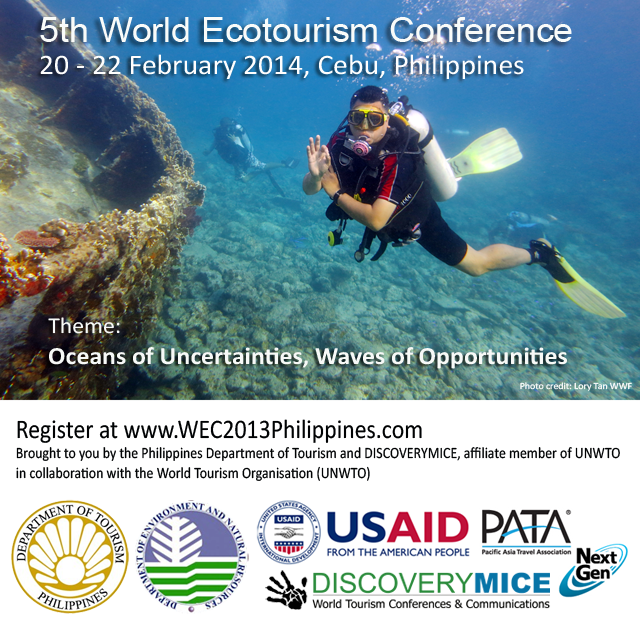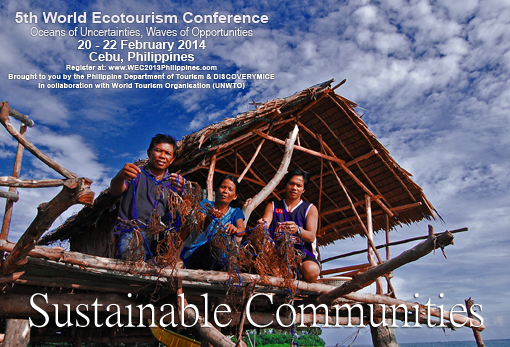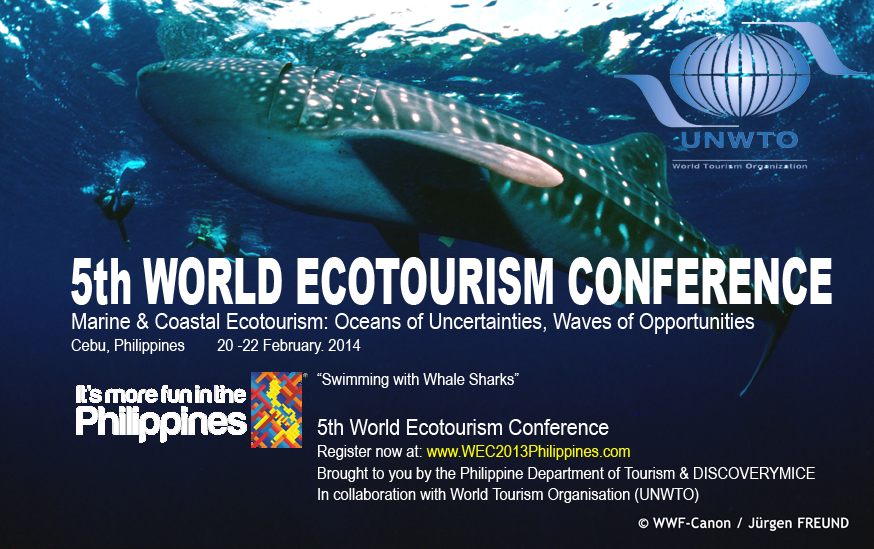Online Registration
|
HURRY!
The World Ecotourism Conference is the world's most important ecotourism conference for developing countries. It aims to pool political, financial and intellectual resources to empower both public and private sector practitioners, professionals & stakeholders in engaging and enforcing sustainable and practical tourism development policies and practices in every aspect of tourism development, management, financing and marketing. |
SPECIAL ANNOUNCEMENT: Due to overwhelming response, online registration for Filipino delegates will close on 14 February 2014 at 5:00pm (GMT+8). If you have any queries, please direct them to registration@wec2013Philippines.com.
 |
Who would be attending?
Click to see who would be attending.
What would you be learning?
Marine & Coastal Ecotourism

Among the 55,000 islands in the oceans around the Asia and the Pacific region, there are many developing countries are turning to promote their marine, coastal and riverine natural resources for ecotourism. Instead of overexploiting marine resources, marine and coastal ecotourism provide excellent export opportunities for many developing countries especially small island state countries. Local governments are increasingly aware of the need to provide the necessary capacity building for local communities in conservation work and the business of ecotourism in order to ensure that the long term ecological sustainability of the natural resources and the financial sustainability of the business itself.
Promoting a sustainable model for marine and coastal ecotourism is in the interests of natural resource managers, environmentalists, tourism promotion agencies, and local communities who traditionally depend on the marine stock for their livelihood (Pinsky et al. 2005). If appropriate research, policies and strategies are embraced responsibly to balance the benefits between conservation, communities and commerce, sustainable activities for eco-tourists can be generated from marine resources instead of treating them solely as a food source.
Marine Protected Areas
Marine Protected Areas (MPAs) is one way that coastal regions can develop a sustainable tourism industry by catering for activities such as recreational fishing, whale watching, shark ecotourism and scuba diving. There are many some examples in the Asia-Pacific region and around the world but with an accelerating population growth, the degradation of marine resources is alarming and more needs to be done.
Shark Ecotourism

Shark ecotourism and shark sanctuaries around the world have recorded increasing tourism revenue generated by the presence of shark species. For example, in 2010 in the Pacific Island state of Fiji alone, shark-related diving contributed US$ 42.2 million to the country's economy, while shark-diving operations produced US$ 4 million for Fijians through salaries and local levies. Similarly, in Palau, 8 per cent of the country's GDP, approximately US$ 18 million annually, is derived from shark tourism. According to the Pew Environment Group, “Studies conducted on the economic value of sharks in Palau's waters indicate that a single reef shark contributes approximately US$ 179,000 to the country's economy every year, compared to a one-time value of US$ 108 if caught and sold on the market". Many island states in the Pacific have also declared their entire Exclusive Economic Zones as shark sanctuaries providing vital protection for the vulnerable species, some of which are endangered with extinction. Source: Pew Environment Group (2012)
Snorkelling & Dive Tourism
Snorkelling and scuba diving have increased significantly over the last 30 years, as evidenced by the rapid increase in the number of certified divers to 136,000 (PADI 2012). However, concerns have been raised over the impact of dive tourism on marine biodiversity (Hasler and Ott 2008; Uyarra et al. 2009). For example, large-scale diving activity has a direct negative impact on corals including increased sedimentation and broken and damaged corals (Hampton and Haddock-Fraser 2010).
Whale Watching
Whale watching attracted some 13 million tourists globally in 2008. Whale watching is estimated to generate US$ 2.1 billion per annum in tourism revenue worldwide and employed around 13,000 workers (Cisneros-Montemayor and Sumaila 2010). Other estimates have put this as high as 18,000 (Pew 2010). The economic benefits of, as yet, unexploited whale watching opportunities “could bring the value of whale watching to US$ 2.5 billion globally, with 19,000 jobs employed by the global industry”. In particular, the Asia & the Pacific region could potentially gain an extra US$ 46.7 million through direct (i.e. ticket sales) and indirect (i.e. accommodation, additional food and lodging) economic benefits (Scarpaci and Parsons 2011).
Recreational Fishing
Recreational fishing is another popular tourist activity which occurs in approximately 118 maritime countries. In 2003, nearly 60 million recreational anglers around the world generated a total of about US$ 40 billion in expenditure, supporting over 950,000 jobs. (Cisneros Montemayor and Sumaila 2010). UNEP – Green Economy & Trade (Tourism)
Who are the speakers?
Click to see the panel of speakers.
Preliminary Programme
20 Feb 2014
8:00 - 08:30 Transfer to Conference Venue
9:00 - 12:00 Opening Ceremony
Welcome Remarks
Honorable Hilario Davide, Jr., Governor, Cebu
Honorable Michael L. Rama, Mayor, Cebu City
Opening Remarks
Honorable Ramon Paje, Secretary for Environment
and Natural Resources
Honorable Ramon R. Jimenez, Secretary for
Tourism
Congratulatory Remarks
Mr. Xu Jing, Regional Director for Asia and the
Pacific, World Tourism Organization (UNWTO)
Mr. Martin Craigs, President and CEO, Pacific
Asia Travel Association (PATA)
Ms. Gloria Steele, Mission Director, USAID
12:00 - 13:00 Lunch
13:00 - 15:20 Keynote Addresses
Dr. Cristian
Samper, President and CEO of the Wildlife Conservation Society
(WCS), USA
Mr. Lory Tan, CEO/Vice President of Trustee Board,
WWF, Philippines
Dr. Alan White, Senior Scientist, The Nature
Conservancy Global Marine Initiative and Pew Fellow in Marine
Conservation, USA
14:00 - 15:00 Ministerial Roundtable on Ecotourism & Green Tourism (tbc)
15:20 - 16:20 Asia Pacific Ecotourism Society / B2B Networking
16:30 - 17:00 Transfer to Hotels to refresh
19:30 - 21:30 Welcome Dinner
21 Feb 2014
08:30 - 09:50
Plenary Session 1. Coastal Areas and
Communities: Mitigating Vulnerability through Sustainability
Best practices in sustainable ecotourism developments ensure that ecotourism activities and facilities demonstrate conservation, cultural and community values. However coastal areas and communities are most vulnerable to climatic changes and natural hazards such as hurricanes, storms, flooding and earthquakes. Is investing in coastal ecotourism developments risky? Would sustainable development and management help to mitigate and adapt to natural hazards? Sharing past experiences and supporting the development of coastal ecotourism, experts will discuss the necessary institutional support, capacity building, mitigation and adapation guidelines as well as land planning and development guidelines that can help to reduce risks and attract tourism investments to coastal regions.
9:50 - 12:00
Plenary Session 2. Destination Development:
Socio-Economic Value Beyond Beaches
In many countries, beach front hotels and resorts are clustered in outlying islands and coastal areas generating various environmental challenges but contributing significantly to local employment and economy. It is postulated that the growth and competitiveness of these tourist regions can be enhanced by expanding beyond beaches and incorporating non-beach activities eg heritage, culture, culinary as well as ecotourism, adding a socio-ecological dimension to the diversity of touristic activities. Radial development models help to diversify tourism experiences, decongest tourist hubs, distribute tourism revenue to rural communities and unlock idle rural resources for economic returns. Recent studies from around the world have shown high educational and socio-economic value of low impact ecotourism experiences like shark ecotourism (PEW Environment Group), scuba diving/snorkelling/coral reefs (Conservation International & Tourism Queensland), dolphin/whale watching (WWF Philippines), mangrove swamps/tours (Conservation International), community-based tourism (Ministry of Tourism,Malaysia) and others. This session will discuss the challenges, critical factors and opportunities that can be undertaken by local government units, investors and practitioners.
12:10 - 13:00 Lunch
13:30 - 14:30
Session 3. Marine Protected Areas (MPA) for Ecotourism
Ecotourism is vitally important to finance the management and maintenance of Marine Protected Areas (MPAs) and ecotourism operators depend on the qualities of the MPAs including the protection of marine life to deliver marketable experiences for eco-tourists. A symbiotic partnership between ecotourism operators and MPAs helps to generate socio-economic benefits for coastal communities and make positive contributions to marine life conservation and scientific research. In many instances, the quality of the MPA helps to define the economic value of ecotourism development such as the Great Barrier Reef Marine Park. Unfortunately the interface between tourism and conservation often co-exist in conflict. Stakeholders from the public, private and scientific sectors need to find common ground but what is the formula? What are the challenges and what are the opportunities to start up these partnerships?
14:30 - 16:30
Session 4. Ecotourism Marketing: Critical Success Factors
Ecotourism marketing mix includes the four Ps in business marketing (product, price, promotion, and place). However experts insists that the critical marketing success factors in ecotourism gravitates towards programming, people, and partnerships. Find out how incorporating research, responsibility and respect can turn simple marketing ideas to successful marketing innovation.
14:30 - 16:30 Parallel Session: Ecotourism Research Symposium
16:30 - 17:30 Conclusions
17:30 - 17:45 Closing Ceremony
22 Feb 2014
07:00 - 18:00 HOSTED TECHNICAL TOUR TO BOHOL (Full day)
Chocolate Hills, Tarsier Sanctuary, Community-based Loboc River Lunch Cruise and others
23 Feb 2014
06:00 - 18:00 Optional Full Day Tour to Oslob: "Swim with Whale Sharks & Sumilon Island"
Optional 2 Days/1 Night - Malapascua Island - "Diving with Tresher Sharks"
Optional 2 Days/1 Night - Bantayan Island - "Egg Basket" of Philippines





